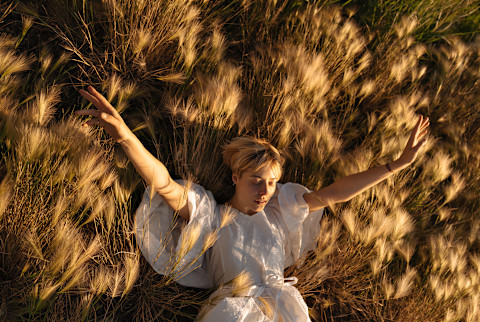How My Rare Cancer Diagnosis Launched A Journey Of Self-Discovery + What I Learned

Imagine you're driving to a routine doctor appointment, windows down, hair blowing in the wind, with the Rolling Stones blasting in the background.
Then, during that appointment, your doctor becomes speechless until he eventually breaks the news: You have a large malignant-looking tumor in your uterus. The next day, you're told the tumor is a rare form of aggressive cancer, indicating it was likely a secondary or tertiary tumor.
Unfortunately, none of those scenarios were imaginary for me. Following that appointment, I underwent a series of tests to assess the situation and determine what paths were available for healing.
This was just the beginning of a journey that I never hoped to travel yet one that has changed the trajectory of my life and altered how I think about my own abilities.
The beginning of my unexpected cancer journey.
I spent weeks thinking tumors had spread all over my body until I finally received news that the aggressive tumor was localized. Though it was too big for surgery, there was a medical plan available that would work for me.
The next day, I had a port-a-cath inserted and began an arduous path toward healing (combined chemotherapy, radiation, and brachytherapy). My world as I knew it had come to a halt. Nothing seemed to make sense anymore. It was terrifying, but at the same time, I was just happy the cancer hadn't spread any further, so I chose to hold on to that perspective.
From that moment on, managing my perspective became a vital tool for healing. It meant taking control of my ability to respond (what I call response-ability) to a given situation and looking for opportunity in everything. I realized I had the opportunity to create my own experience and, in essence, a new life.
The thought of losing my life helped me gain it back.
I am a very resourceful and independent woman, and even still, I was looking to others and the external world for answers. I went on a long path of self-discovery in order to gain clarity about my new life.
I reached out to medical practitioners outside of my chosen medical team, which helped me learn more about my illness and gave me confidence in the treatment I was receiving. I also built relationships with those providers in the process and leaned on them for additional support and discussion.
I created a network of friends and family to provide me with the emotional support I needed. I was very selective about who I brought into that network—I longed for positive and constructive people who could not only provide me love and support but who also shared my values.
Friends who had been through similar experiences offered suggestions and comfort. They helped me get through otherwise painful steps on the journey, like losing my hair or going in for quarterly checkups only to feel like my life had been flipped upside down, once again.
Through word-of-mouth, I learned about alternative therapies that could complement my treatment and help me dig deeper within myself. I tried everything that felt right to me: bio-decoding, psychology, reiki, quantum healing, hypnosis, reflexology, supplements, and dietary changes. Each of these contributed to my well-being in some way.
In these therapies, I had to face repressed traumas from both my childhood and adult life, which I had conveniently hidden away. While the process seemed daunting at first, airing these traumas out in the open was essential for healing.
Eventually, I was able to integrate the concepts I'd learned from various therapies and turn them into behaviors and values that I am now deeply committed to. I check in with myself often to decide if I need to make modifications, as I am constantly evolving.
In terms of the cancer, I had a radical remission and went on to enjoy months of relative tranquillity. Unfortunately, I faced further setbacks later on, which became more opportunities to learn and grow.
My biggest takeaways.
Sharing my story on social media created a space for intimate conversation from people with similar, or different, health journeys. My goal is to encourage people to take response-ability in their own lives (i.e., going to checkups, looking inward, evaluating their friendships, etc.). I've learned it's possible for people to make small but meaningful changes in their lives, which, in turn, result in greater joy.
Due to social conditioning and the expectations within a corporate environment, I was not accustomed to being vulnerable before my illness. When I was first diagnosed, I found myself in a constant state of "uncertainty, risk, and emotional exposure," which is how Brené Brown defines vulnerability. These feelings were so overpowering, I had no choice but to fully embrace them.
Being vulnerable has helped my connections with people become more meaningful and helped manage my anxiety. Whether it's related to health, family, children, work, love, friendship, your inner self, or even the pandemic, disruption can come as a shock. Even though disruption can feel isolating, my experience has taught me: I'm never truly alone.
